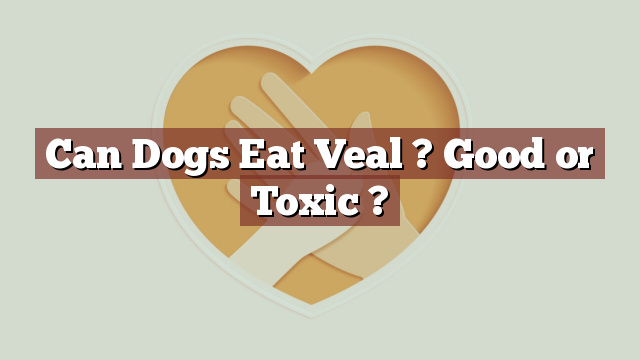Can Dogs Eat Veal? Good or Toxic?
Knowing what foods are safe for our dogs is crucial for their overall health and well-being. As responsible pet owners, we need to ensure that the food we offer to our canine companions is not only tasty but also safe. One such food that often raises questions is veal. In this article, we will explore the nutritional value of veal, its safety for dogs, potential risks or benefits of feeding veal to dogs, and what to do if your dog happens to consume veal.
Nutritional Value of Veal: What Does it Offer for Dogs?
Veal, which is the meat obtained from young calves, is known for its tender texture and delicate flavor. In terms of nutritional value, veal is a good source of protein, vitamins, and minerals. Protein is essential for dogs as it helps in muscle development, repair, and maintenance. Additionally, veal contains essential amino acids that contribute to the overall well-being of our furry friends. It also provides vitamins such as vitamin B12, which aids in the functioning of the nervous system, and minerals like zinc and iron, which are crucial for various bodily functions.
Can Dogs Eat Veal? Is it Safe or Toxic for Them?
Yes, dogs can eat veal, and it is generally safe for them when consumed in moderation. However, there are a few factors to consider. It is important to ensure that the veal is cooked thoroughly to eliminate any bacteria or parasites that may be present in raw or undercooked meat. Furthermore, it is advisable to remove any bones from the veal before offering it to your dog, as bones can pose a choking hazard or cause injury to the digestive tract.
Veterinary professionals recommend introducing veal gradually into a dog’s diet to monitor for any adverse reactions or digestive issues. It is also crucial to remember that every dog is unique, and what may be safe for one may not be suitable for another. If your dog has any pre-existing health conditions or dietary restrictions, it is best to consult with your veterinarian before adding veal to their diet.
Potential Risks or Benefits of Feeding Veal to Dogs
While veal can offer nutritional benefits to dogs, there are potential risks associated with feeding it to them. One concern is the possibility of allergies or sensitivities to veal. Dogs, like humans, can develop allergies to certain foods, including veal. If you notice any signs of an allergic reaction such as itching, swelling, or gastrointestinal distress after introducing veal to your dog’s diet, it is advisable to discontinue feeding veal and consult with a veterinarian.
Another consideration is the fat content of veal. Some cuts of veal may have a higher fat content, which can lead to weight gain and other health issues if consumed excessively. As with any food, moderation is key, and veal should be offered as part of a balanced diet that includes other protein sources, vegetables, and grains.
My Dog Ate Veal: What Should I Do?
If your dog happens to consume veal, there is usually no cause for immediate concern, especially if it was properly cooked and bone-free. However, if you notice any unusual symptoms such as vomiting, diarrhea, or lethargy, it is essential to monitor your dog closely and contact your veterinarian if these symptoms persist or worsen. In cases of potential food poisoning or ingestion of spoiled veal, prompt veterinary attention is crucial to ensure your dog’s well-being.
Conclusion: Veal Can Be Part of a Balanced Diet for Dogs
In conclusion, dogs can eat veal as part of a balanced diet. Veal offers valuable nutritional components such as protein, vitamins, and minerals that contribute to a dog’s overall health. However, it is important to cook veal thoroughly, remove bones, and introduce it gradually into a dog’s diet to monitor for any adverse reactions. As always, it is recommended to consult with a veterinarian regarding your dog’s specific dietary needs and any potential concerns before making significant changes to their diet. By making informed choices, we can ensure that our furry friends enjoy a safe and nutritious diet.
Thank you for investing your time in exploring [page_title] on Can-Eat.org. Our goal is to provide readers like you with thorough and reliable information about various dietary topics. Each article, including [page_title], stems from diligent research and a passion for understanding the nuances of our food choices. We believe that knowledge is a vital step towards making informed and healthy decisions. However, while "[page_title]" sheds light on its specific topic, it's crucial to remember that everyone's body reacts differently to foods and dietary changes. What might be beneficial for one person could have different effects on another. Before you consider integrating suggestions or insights from "[page_title]" into your diet, it's always wise to consult with a nutritionist or healthcare professional. Their specialized knowledge ensures that you're making choices best suited to your individual health needs. As you navigate [page_title], be mindful of potential allergies, intolerances, or unique dietary requirements you may have. No singular article can capture the vast diversity of human health, and individualized guidance is invaluable. The content provided in [page_title] serves as a general guide. It is not, by any means, a substitute for personalized medical or nutritional advice. Your health should always be the top priority, and professional guidance is the best path forward. In your journey towards a balanced and nutritious lifestyle, we hope that [page_title] serves as a helpful stepping stone. Remember, informed decisions lead to healthier outcomes. Thank you for trusting Can-Eat.org. Continue exploring, learning, and prioritizing your health. Cheers to a well-informed and healthier future!

